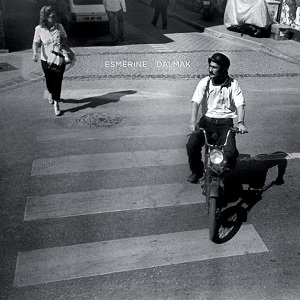Just remember this record isn’t looking to pass an exam. And you’re not meant to mark it ;0 .
Just remember this record isn’t looking to pass an exam. And you’re not meant to mark it ;0 .

http://cstrecords.com/cst096/ http://www.konkurrent.nl
What’s in a name?
I read somewhere – probably on the press bumpf that accompanies the LP’s webpage – that the Turkish word dalmak is a verb, meaning roughly to be immersed, and that immersion can cover a great deal of permutations, be they temporal, spiritual, or physical. I also read that this LP is the result of the Turkish leg of Esmerine’s big European tour (which also, somehow, took in a back room in a pub/arts centre in Leiden), with the band eventually taking up residency in Istanbul to work on this recording. Now all that’s fine to know, and (obviously) I can see why the band and label think we should be aware of this as a sort of prequel to listening. But, sometimes ignorance is bliss. If you didn’t know all the stuff about immersion and residencies and meetings of musical traditions, and took this record on its own merits as a piece of music with no strings or history attached (as I did on the first few listens) then you’d enjoy it just fine. You may think it a bit of a slow burner, for sure, and you’d notice things pick up considerably when it becomes more “oriental” (and no, no takes on Edward Said in this review I promise) after an overly dreamy start. But it’s fine, and a bit reminiscent of Peter Gabriel’s Last Passion of Christ soundtrack; that is if my memory isn’t playing tricks on me.
No, the problems come when you bring all the other stuff into the equation. Whilst at some point a listener should be aware of the record’s provenance, (“doing a dalmak” regarding sleevenotes and background info), there’s a nagging feeling here that the pitch is suddenly queered. You begin to feel that the work is actually a bit of a curate’s egg, not delivering on qualitative assumptions based on your own assumption that possessing knowledge of a work automatically improves your appreciation and enjoyment of it. Suddenly the opening two tracks or the beautiful White Pine don’t feel as if they should be on the LP; rather than being dreamy mood setters, you start to question their place at the start of this record. From then on you’re on the look out for instances of “successful integration” and how instruments like the Meh, or the Darbuka counterbalance Rebecca Foon’s cello; rather than realise that there are some foot stompingly good and incredibly atmospheric tracks here. Lost River Blues II is a vibrant piece and Translator’s Clos I, or Barn Board Fire are highly entertaining cuts of East-West folk psyche, stalking imperiosusly through its allotted time and nodding to all sorts of stuff such as Amon Duul II’s Wolf City or those recenty dug up and reissued “Turkish Psyche” compilations. And Hayale Dalmak is a brilliantly fluid piece of aural gauze that keeps airbourne long enough to lull anyone into a reverie. Best is saved till last with the magnificent Yavri Yavri, a beautifully meditative cut that seems to floats around in a shimmering, luminous bubble.
Just remember this record isn’t looking to pass an exam. And you’re not meant to mark it ;0 .
